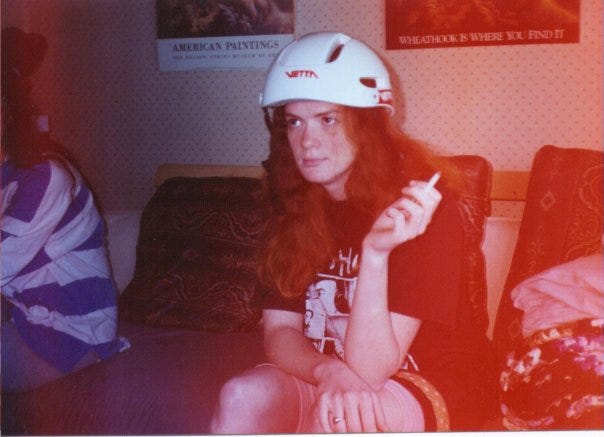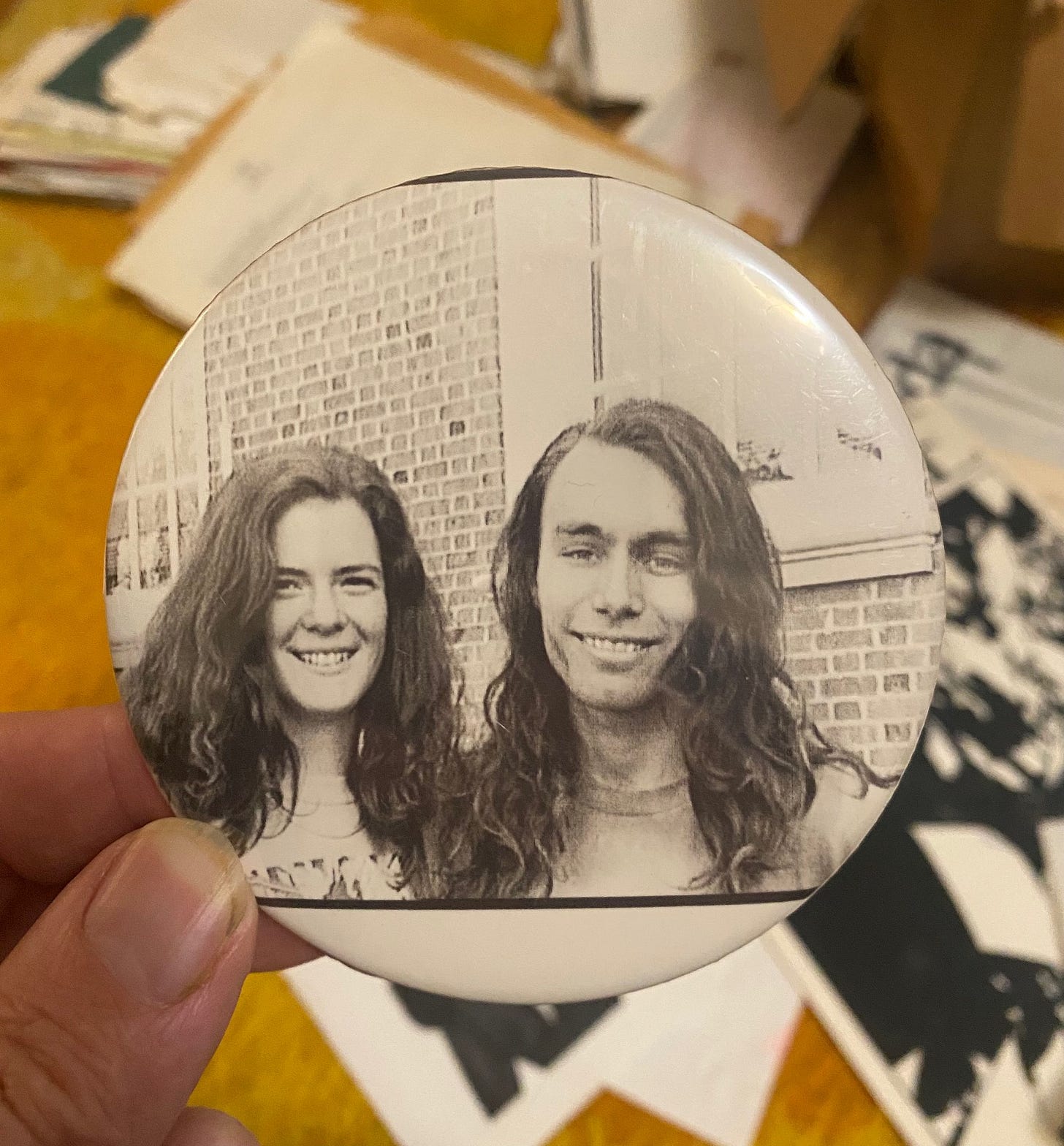While I was staying with my college friend Annie for a few weeks, the other member of our old triumvirate, Zach, came to visit, and as a fun humiliating activity Annie got out a box full of our old letters to look through. (We all met in a writing program, pre-internet, so after we dispersed we wrote each other actual on-paper letters.) It is a torture specially tailored to a writer to have to listen to his own juvenile prose read aloud—so melodramatic, so self-serious, ugh what a pretentious twerp—but what really struck me was not the style of our letters but the content. It sounded as if Annie and I were perpetually on the outs; either she was mad at me, or I was mad at her for being mad at me. Which came as a surprise to us both, since we remember our long friendship as good companionable fun—hanging out and goofing off, pulling capers, driving cross-country, playing road bingo, riding the circus train. But according to the evidence, our relationship was tempestuous. Zach—who, unlike me, actually dated Annie—was unsurprised by the volatility of their correspondence. One letter from him had been torn up and taped back together. “Annie was more excitable then,” he sighs. Another document consisted of a list Zach had compiled of reasons why he and Annie should have children, each profanely rebutted by Annie, in red ink.
“It’s possible we were a lot dumber than we thought,” reflects Annie.
Strange now to regard those passionate, capricious young people from the perspective of our more placid and stable middle-aged selves—Annie now long married, Zach living with the mother of one of the many children he fathered through sperm donation in the 90s. You don’t like to admit, or believe, that the crazy incandescent energy of youth has dissipated, but, on the other hand, you wouldn’t want to go back there, either—all those dramatic flareups and fallings-out, betrayals and recriminations, breached friendships and breakups, epic grudges and reconciliations. I still have the occasional outbreak of atavistic passion—bouts of irrational jealousy or rage, embarrassing as adult acne—but I’ve amassed enough experience by now at least to recognize them as irrational, even if I can’t quash them. I still have to feel the dumb emotions, but I no longer accept them at face value as valid reactions—believing, for example, that I am unassailably in the right and have been grievously wronged, and should demand apologies to appease my insulted honor or plot my just and terrible retribution.
But apparently the only way to learn this is by first being an idiot for twenty or thirty years, by hurting people you care about and making yourself miserable—through Skinnerian negative reinforcement, by repeated electric shocks of shame and regret. These regrets are not all trivial ones. Yesterday I talked to my friend Leah, returned from visiting her son at college, who’d just been dumped by his best friend. She’s a wise enough parent to know there isn’t much she can do to advise or help her son at his age, but she recognizes some of the tendencies that alienated that friend from her own history; thirty years ago, she lost a friend because of some of the same intractable traits. She never had the chance to reconcile; her friend died a few months after their breach. She sometimes thinks how strange it is that he’s still dead, forever twenty, while she’s learned and matured, married, raised children, built a career, grown old.
There’s a temptation to disown your idiot know-it-all past self, an impulse I felt intensely while listening to those old letters read aloud. Some of my favorite artists (control freaks, all) renounced or suppressed their own juvenilia; Francis Bacon seems to have destroyed most of his paintings before the breakthrough Crucifixion; Stanley Kubrick once had a plane turned around that was delivering the reels of his first feature, Fear and Desire, to a festival screening. This seems to me not only a kind of insanity, like autocratic governments censoring their own histories, but a disservice—trying to present themselves as fully formed and accomplished from the start, denying aspirants the chance to see their apprentice work. Thomas Pynchon admirably resisted this impulse in publishing his own journeyman short stories in the collection Slow Learner; “I mean I can't very well just 86 this guy from my life,” he wrote in the introduction. In college, cleaning out a storage space, I once threw out a drawing I’d done in high school—a big, ambitious cubist/collage self-portrait—thinking it pretentious. I remember that now with guilt, as a crime against my former self. Recently I found myself remembering a bad short story I wrote in college, and for the first time I tried to imagine what I would say now, as a writing professor, to the student who’d written it. I decided that, although I agreed with the class consensus that there wasn’t enough there to make it a story—no dramatic arc, no climax, no “stakes”—I didn’t think it should be entirely dismissed, either. There was one bit, maybe just a line—the conceit and cadence of the ending—that read like something written by a real writer.
I’ve known Annie for so long now that to me she is one continuous being existing throughout three decades, so that the 56-year-old woman currently undergoing chemo, shorn of her hair and breasts, is superimposed over the redheaded twenty-year-old I ate bagels with in her apartment on St. Paul Street. But confronted with documentary evidence of our younger selves, I can look back on that college girl and see her, for the first time, as a different person, a stranger. And exasperating as she was, I adore that young woman. She was impetuous, persnickety, fickle and difficult—as Zach says: “Excitable.” Annie and I like to fantasize about the oration I will give at her memorial service: “Many today have spoken of Annie’s cunning; of her deviousness; her duplicity. [This is all for some reason delivered in the voice of an old local raconteur/sage at the general store.] But, for me, it wasn’t her mendacity; it was the malice. The sheer, cussed spite of the woman.” This eulogy never fails to delight her. There’s a photo of Annie at a party, waiting for her (very late) boyfriend, who seems increasingly unlikely to appear: smoking a cigarette, eyes deceptively calm as a leopard’s beneath her bike-messenger helmet, looking like a woman you would most definitely not want to be the tardy no-show boyfriend of. After she broke up with that guy, she made us detour a hundred miles up the Idaho panhandle on a road trip to leave a dramatic heap of his belongings on the porch of the vacation cabin where he’d never once taken her. (Historical footnote: she later married this same man.) My evil friend Zero, who’s never failed to insult any woman I’ve been involved with, once said admiringly of her: “That girl has spark.”
I wish I could look back at my own younger self with the same forgiving distance, the kind of fond indulgence you’d feel for a fuckup younger brother. “I can’t say I regret it,” Leah said of her decisions in that episode from her past, “because I couldn’t have acted any differently at the time.” It’s a sane perspective, but one not easily cultivated, or maintained. Mostly I still remember my own youth—meaning my entire life up until now—with mortification and remorse. My mother died last year, and even though I’ve always lived my life by a strict policy of potential-regret obviation—particularly with regard to my mother—I nonetheless now, at unpredictable moments throughout the day, suffer sporadic seizures of shame and remorse too painful to tolerate for more than a few seconds: trips I should have gone on, visits I should’ve made, things left unsaid, undone. My girlfriend told me that, immediately after a bad car accident involving her whole family, as she lay strapped down in an ambulance next to her father, she wanted to apologize—for having been such a standoffish adolescent, averse to hugging or demonstrations of affection. “But you can’t go through your life overflowing with love toward everyone,” she says. You act the way you do because you need to—because young people need to establish boundaries and autonomy, or because you and your friends have legitimate conflicting needs, or simply because we all have to be jerks sometimes. We’re all a lot dumber than we think. It’s a sympathetic understanding I’m able to extend to everyone other than myself.
I noticed that the stupidest I sounded in those old letters was when I tried to sound wise, as though I knew what I was talking about. Maybe there’s some consolation in knowing that, no matter what, my future self, 60- or 70-year-old me, will look back on me now, on this very essay, as embarrassing. It’s hard, at any age, to comprehend that we’re still very young, because it’s the oldest we’ve ever been, and we figure we ought to know better by now. Maybe you just have to learn to accept, even embrace, being perpetually stupid—what Rilke more artfully called “living the questions”—in the dubious assurance that you’ll one day be smart enough to rue it.
Less painful than reading our letters was looking through the stacks of photos. (I suppose we’re the last generation who’ll have physical photographs.) There’s one shot of Annie at the summer camp where we all taught ca. 1986, looking cool and imperious, like a dame in a noir you better not cross—cigarette held between her fingers, lips pursed to blow. Another, printed on a novelty button, shows her and Zach at our college’s annual Spring Fair—their features sharper, skin softer, their now-vanished hair long and lustrous. In retrospect, they look adolescent and unformed, the nascent shapes of the faces I know, now lined and sculpted by our shared history, like the early versions of Peanuts or the Simpsons before their appearances became codified, canonical. And yet, looking at those pictures, I was struck by something I never noticed about my friends at the time, blinded as we were by the frenetic blur of the present: how beautiful we all were.




This was beautiful, thank you.
I often draw comfort from a similar observation that Oscar Wilde made in a letter to a friend after visiting his wife's grave in 1899, four years after the conviction and prison sentence that broke his health and spirit, and only a year before his death. Given the sexual mores of the time, he could easily have blamed himself for the breakup of their marriage -- or blamed himself for suing the Marquess of Queensberry for criminal libel, or for failing to flee to France (as he had been advised to do) before he lost that suit and was then convicted of homosexuality. Instead he wrote:
"It was very tragic seeing her name carved on a tomb – her surname, my name not mentioned of course. . . . I brought some flowers. I was deeply affected—with a sense also of the uselessness of all regrets. Nothing could have been otherwise, and Life is a terrible thing."
Gorgeous. Thank you. I freaking hate when people comment on an essay with a link to their own essay, but I am physically unable to restrain myself. Doubtless I will be embarrassed by all this soon enough.
https://doctorwaffle.substack.com/p/dead-letters-week-37-of-52-mini-essays